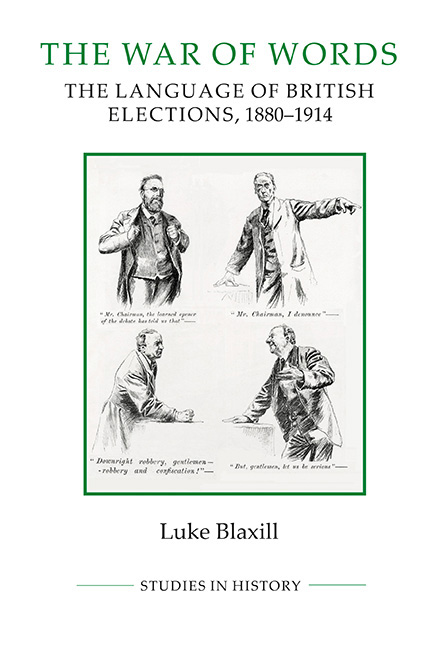Book contents
- Frontmatter
- Contents
- List of figures
- Acknowledgements
- Abbreviations
- Technical glossary
- Introduction : the challenge of reintegration in political history
- 1 On method : text-mining, corpora and the historical study of language
- 2 The impact of reform : the general elections of 1880 and 1885
- 3 The impact of home rule : the general elections of 1886 and 1892
- 4 The impact of imperialism : the general elections of 1895 and 1900
- 5 The impact of New Liberalism : the general elections of 1906 and 19101
- Conclusion: who won the war of words?
- Appendix 1 Technical and methodological
- Appendix 2 Statistical
- Bibliography
- Index
2 - The impact of reform : the general elections of 1880 and 1885
Published online by Cambridge University Press: 26 April 2020
- Frontmatter
- Contents
- List of figures
- Acknowledgements
- Abbreviations
- Technical glossary
- Introduction : the challenge of reintegration in political history
- 1 On method : text-mining, corpora and the historical study of language
- 2 The impact of reform : the general elections of 1880 and 1885
- 3 The impact of home rule : the general elections of 1886 and 1892
- 4 The impact of imperialism : the general elections of 1895 and 1900
- 5 The impact of New Liberalism : the general elections of 1906 and 19101
- Conclusion: who won the war of words?
- Appendix 1 Technical and methodological
- Appendix 2 Statistical
- Bibliography
- Index
Summary
The general election of March 1880 was fought during a severe agricultural depression, and amidst the dual strains of inflated income tax and recent wars in Afghanistan and southern Africa. In the absence of a burning national issue that matched (for example) the Boer War in 1900 or free trade in 1906, Trevor Lloyd has argued that Gladstone set the agenda to finance and foreign policy, whereas Disraeli's attempt to campaign on Irish Home Rule failed to arouse popular excitement. The result was a decisive Liberal victory: they registered 110 gains, securing 352 seats to the Conservatives’ 237, and a Commons majority of fifty-two. It seemed to the Liberals that the electorate had rejected Disraeli's vague jingoism, and voted with rationality and intelligence against a profligate government which had failed to pass any meaningful domestic reform since 1876, preferring instead to fight adventurous, costly and morally dubious wars overseas. Jon Parry has described the election campaign and its result as ‘a hymn to the rationality of the Liberal electorate’.
In East Anglia the results were somewhat atypical in that the Liberals failed to make the inroads into tory rural strongholds that they managed elsewhere. Two of the five double-member county divisions saw negligible electoral activity, with Conservatives Sir Thomas Thornhill and William Biddell, and Sir Edward Birkbeck and Sir E. H. K. Lacon, being returned unopposed for Suffolk Western and Norfolk Northern respectively. The other three county seats each saw a lone Liberal challenger from tenant farmers Robert Lacey Everett, Anthony Hamond and Robert Gurdon in Suffolk Eastern, Norfolk Western and Norfolk Southern respectively, but only the latter was successful (by a single vote). In the boroughs, however, the picture was quite different. In 1874 the popular mustard magnate J. J. Colman at Norwich had been the only Liberal member, with the remaining eight borough seats returning Conservatives. In 1880, however, the Liberals managed to win five, with Jacob Tillett gaining the second Norwich seat, and the Birmingham Caucusite Jesse Collings also securing one at Ipswich. At Bury St Edmunds and King's Lynn the Liberals also managed to wrest one seat from their opponents, with J. A. Hardcastle and Sir W. H. B. Ffolkes achieving victories.
- Type
- Chapter
- Information
- The War of WordsThe Language of British Elections, 1880–1914, pp. 44 - 80Publisher: Boydell & BrewerPrint publication year: 2020

